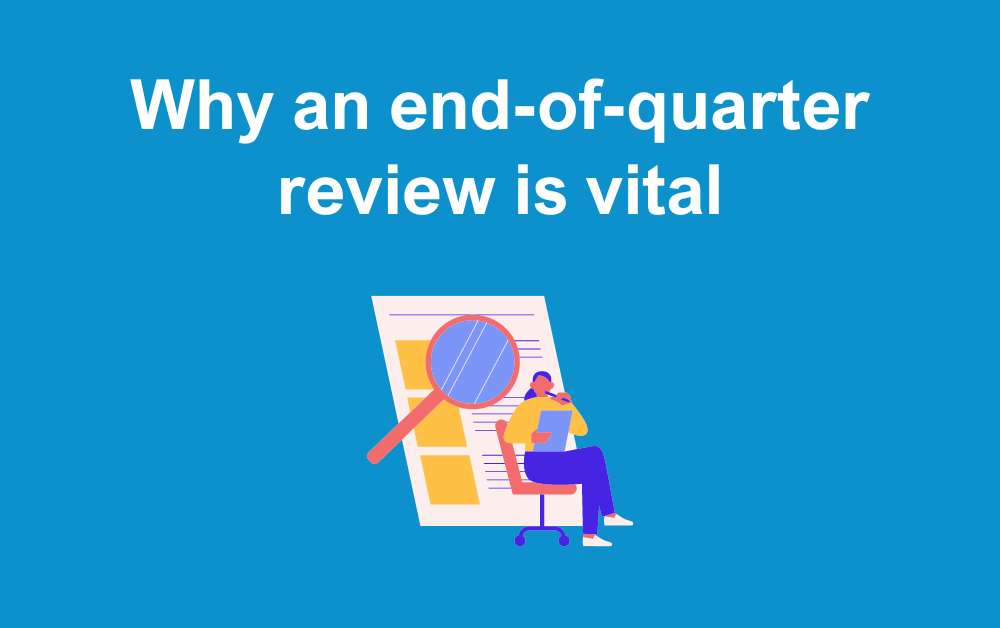End-of-quarter reviews are important. The end of June / start of July not only represented the end of Q2 / start of Q3. It is also the first quarterly review since the end of the financial year.
Scotland and England take note! It is always important to review your performance, no matter how good or bad.
Let’s take a look at the main benefits of holding end-of-quarter reviews.
Mid-Year Performance Review
A mid – year performance review is a time to analyse your current performance of the year to date. Q2, which typically runs from March to June, has come to an end, and you should be taking this opportunity to evaluate your progress towards achieving your organisational objectives that you set at the beginning of the year / end of last year.
This review meeting should also bring forward any areas that need an increased focus or improvement. Therefore, make any subsequent adjustments that you feel are necessary towards achieving your future goals & KPIs.

Review your KPIs
Your end of year / start of year meeting should involve setting Key Performance Indicators ( otherwise known as KPIs ). These should be relative to your expected performance and business objectives for the upcoming 12 months. A Q2 review should involve a thorough analysis of your progress towards achieving these KPIs.
Have a look at your current progress towards achieving each KPI. If you are on target / ahead of schedule – then great! If not, take a look at how and where you can improve.
Shine a spotlight on internal business successes. Your employees deserve the chance to share your success stories. Every week, when we hold our regular weekly update, we go round the room and ask everyone to share their highlight of the week. It’s a great way to share praise with the team and make them feel happy and satisfied with the work they are doing.
Check out below an episode of our podcast, where we talk about appreciating your employees.
Personal Employee Development
Personal Learning & Development is a great way to develop your own employees. Aim to hold regular training sessions throughout the year. These can act as a skills reminder for your team. Click here to see a full list of the topics we can cover during Management Training Workshop.
Look back on the skills and qualities you have gained over the past six months in work. You will know yourself if you are happy with what you have learned, but always aim to strive for improvement. Look for new opportunities to learn and develop, whilst also looking back at what learning techniques you benefit most from and look to implement them into your learning and development schedule.
As an employer, set out a personal development plan, that you can re – visit on a monthly basis to re – evaluate your progress. This is a great way to actively track your learning and development.
Check out Alistair’s blog on personal development here.

Opportunity to Adjust
As we touched on previously, a review of progress towards KPIs can so alert you to the need for a change in strategy. Perhaps you are falling behind slightly with your targets, and therefore decide you need to spend more time and manpower on this target. On the other hand, you may feel you are progressing nicely with a target and subsequently allocate less time towards the project.
Areas for Strategies Change
It is important to note that, whilst reviewing your KPIs is a vital part of the review process, acting upon the analysis is just as important and facilitates for future success of your business. If you stick with the current plan which is resulting in under – performance, then it is likely that this is what is going to continue happening. Seek for improvement by altering your business plan and strategy.

Re-evaluate Resource Allocation
If you have addressed your current short fallings in achieving your KPIs, then it may make sense to reallocate some resources within your business. This may mean creating a specialised department to deal with issues. At The HR Booth, we have benefitted from re – allocating admin work to a specialised admin support team. They focus solely on admin work, including recruitment, for our clients. This enables other team members to focus on other work and helps to split the work out – avoiding potential burnout.
You may also wish to re – allocate budget as well. Include increased budget for a project that requires more attention. Whereas you can reduce the budget for a project that does not require as much work on it. There is no right or wrong answer here, as this will all be business specific. This is an approach we take with our clients and encourage them to never compare themselves to other businesses – do whatever suits their needs best.
All of the aforementioned will mean you’ll need to have a comprehensive people plan in place.
Would you look at that! We have a podcast on the very subject, linked in below.
Continue The Success
Seek to continue and improve upon the positive strides you have already made in certain areas. Whilst we have suggested allocating resources elsewhere, this does not mean to fully neglect them. A balance across the board is needed here for continued success. Hold regular meetings with senior management to discuss how best to move forward with this.
If an employee is thriving and delivering with a current project then it would not be right to move them from this. Allow them to continue to thrive whilst keeping an eye on other areas that need to be focused on, and then allocate your resources accordingly. If an employee is doing well with a project, make sure to shout them out. This is something that will go down well – everyone loves praise don’t they? But is it nice to recognise your employees when they are performing well. If you do decide to move them away from their current project, make sure that you let them know this is not because of their performance, rather you are re – allocating resources to suit your business needs.

Making Time for Financial Planning
A full end-of-quarter review should also incorporate the financial situation of your company. You will have implemented a budget for certain projects; therefore, this will need reviewed against the overall financial health of the organisation. There is an obvious need for a strong financial position and the associated benefits such as having adaptability to the ever-changing market and also opportunities for growth.
Cash Flow Analysis
We might be stating the obvious here – but positive cash flow is an essential part of a business function. Cash flow analysis should be happening regularly anyway, but even more so when you are having a Q2 review. This can involve senior management, where you can consult with them, and may be appropriate to discuss if you are re – allocating resources and / or budget. If project ‘X’ is taking up 10% of your time but 30% of your budget, then this is something that needs address and acted upon accordingly.

Employee Involvement
Perhaps the most important reasons why you should hold quarterly updates is that it provides your employees with the platform to voice their opinion on work-related matters. As the employer, you must ensure that you operate an open forum policy, allowing all staff ( if they wish ) to have their say. This helps the employees feel valued, respected and heard – something which is extremely important for the success of your organisation.
How to Involve Employees
Employees out with senior management may have some valuable suggestions and feedback to provide. It is important that you endeavour to capture this feedback on a regular basis – we aim to do this only a monthly basis. A simple method is through survey – we use Microsoft Forms. This is a perfect way to gather feedback and suggestions from your team. You can then plan out how best to implement this into your business.
You should be aiming to review your Key Performance Indicators ( KPIs ) on a regular basis, with the end of month / end of quarter providing the perfect opportunity to conduct a thorough review, incorporating the full team into this too. Your team will have some valuable suggestions, which will be worth implementing. In addition, this will help create a sense of involvement amongst the other employees. They will feel respected and valued that the management are sharing important business information with them and asking for feedback. Q2 reviews should not only focus on business performance but also personal performance too.
As a line manager, you can work with your team to come up with personal developments plans that will best suit their own development, which can then be reviewed accordingly. It is also important to note, that every business is different. Particularly when it comes to re – allocating business resources. Do whatever suits your business needs best.
If you would like any help with any of the topics mentioned within this article, we are always more than happy to support you on this. Get in contact with us via the contact form at the bottom of this page.







